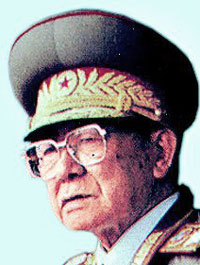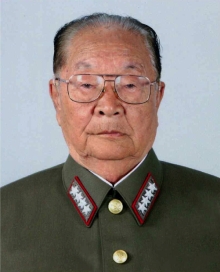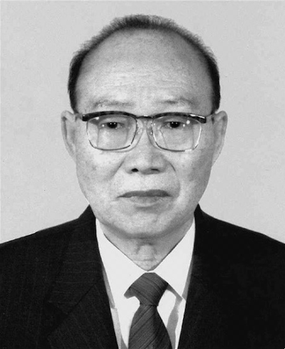Related Research Articles

In the North Korean government, the Cabinet is the administrative and executive body. The North Korean government consists of three branches: administrative, legislative, and judicial. However, they are not independent of each other, but all branches are under the exclusive political leadership of the Workers' Party of Korea (WPK).

Yon Hyong-muk, also spelt Yong Hyong-muk, was a long-serving politician in North Korea and at the height of his career the most powerful person in that country outside the Kim family. He was Prime Minister of North Korea from 1988 to 1992.

Jo Myong-rok was a North Korean military officer who held the military rank Chasu. In 1998, he was appointed first vice-chairman of the National Defence Commission of North Korea, Director of the Korean People's Army General Political Bureau. Previously, he was the commander of the air defence forces.

Parliamentary elections were held in North Korea on 8 March 2009 to elect the members of the 12th Supreme People's Assembly. They were originally scheduled to be held in August 2008 but were postponed for unknown reasons. Observers of North Korea speculated that it was in relation to Kim Jong-il's ill health.
Parliamentary elections were held in North Korea on 3 August 2003. Representatives were elected for five-year terms to all 687 seats of the Supreme People's Assembly, and also to 26,650 positions in city, county, and provincial People's Assemblies. All candidates were members of the three parties constituting the Democratic Front for the Reunification of the Fatherland.

Marshal Choe Kwang was a military leader in North Korea.

Parliamentary elections were held in North Korea on 25 August 1948 to elect the members of the 1st Supreme People's Assembly. Organised by the People's Committee of North Korea, the elections saw 572 deputies elected, of which 212 were from North Korea and 360 from South Korea.
Parliamentary elections were held in North Korea on 26 July 1998. 687 deputies were elected to the tenth Supreme People's Assembly. There was only one nominated candidate per constituency - 687 candidates for 687 seats. According to the state news agency KCNA, the turnout rate was 99.85%, and 100% of participating voters cast their ballots in favour of the registered candidates. About two thirds of the deputies were new, and deputies with a military background reportedly doubled in number. Kim Jong-il was unanimously elected in constituency n°666. According to a Rodong Sinmun editorial, this proved "how deep the Korean people's trust in Kim Jong Il is and how powerful and solid the monolithic unity of the people around him in one thought and purpose and with moral obligation is."

The Central Military Commission of the Workers' Party of Korea (CMC) is an organ of the Central Committee of the Workers' Party of Korea (WPK) which heads the Korean People's Army (KPA).

The death of Kim Jong Il was reported by North Korean state television news on 19 December 2011. The presenter Ri Chun-hee announced that he had died on 17 December at 8:30 am of a massive heart attack while travelling by train to an area outside Pyongyang. Reportedly, he had received medical treatment for cardiac and cerebrovascular diseases, and during the trip, Kim was said to have had an "advanced acute myocardial infarction, complicated with a serious heart shock". However, it was reported in December 2012 by South Korean media that the heart attack had instead occurred in a fit of rage over construction faults in a crucial power plant project at Huichon in Chagang Province.

Jon Pyong-ho was a North Korean officer and politician who served as the Chief Secretary of the Korean Workers Party (KWP) Committee of the North Korean Cabinet, and director of the DPRK Cabinet Political Bureau before his retirement in 2010. Jon was described as the 'Chief architect of North Korea's nuclear programme'. Jon was a general of the Korean People's Army and a close adviser to the late Kim Jong-il.
Parliamentary elections were held in North Korea on 9 March 2014 to elect the members of the 13th Supreme People's Assembly.

Kim Kuk-thae was an elder apparatchik of the Workers' Party of Korea, the ruling party in North Korea.

Kim Chol-man was a North Korean politician and military official. He was a member of several important committees and organizations, including the 6th Central Military Commission, the 6th Politburo, and the Second Economic Committee. He was at the forefront of the North Korean munitions industry, the country's economic base. In old age Kim was no longer considered a major player in North Korean politics, having retired from most of his important posts.

The 10th Supreme People's Assembly of North Korea was in session from 1998 until 2003. It consisted of 687 deputies, and held six sessions.

Parliamentary elections were held in North Korea on 10 March 2019 to elect the members of the 14th Supreme People's Assembly. The elections were announced on 6 January 2019. With only one candidate on the ballot in each constituency, outside observers described it as a show election. 687 candidates for the DPRK deputies to the SPA were elected. Kim Jong Un did not stand for election, marking the first time that a North Korean leader did not participate as a candidate.

Hwang Sun-hui was a North Korean politician who served in several high-ranking positions in the Workers' Party of Korea (WPK), including in the Supreme People's Assembly and the Central Committee of the WPK. She was affiliated with the Korean Revolution Museum from 1965, and was its director from 1990.

The 8th Congress of the Workers' Party of Korea was held at the April 25 House of Culture in Pyongyang from 5 to 12 January 2021. A total of 7,000 people participated in the congress including 5,000 delegates. The Party Congress took place in the midst of the COVID-19 pandemic where no cases were reported.
The 7th Central Auditing Commission of the Workers' Party of Korea (WPK)(7차 조선로동당 중앙 감사위원회) was elected at the party's 7th Congress on 9 May 2016. In its 1st Plenary Session it elected Choe Sung-ho as Chair and Pak Myong-sun as Vice Chair.
The 6th Secretariat of the Workers' Party of Korea (WPK)(6차 조선로동당 비서국), officially the Secretariat of the 6th Central Committee of the Workers' Party of Korea, was elected by the 1st Plenary Session of the 6th Central Committee in the immediate aftermath of the 6th WPK Congress.